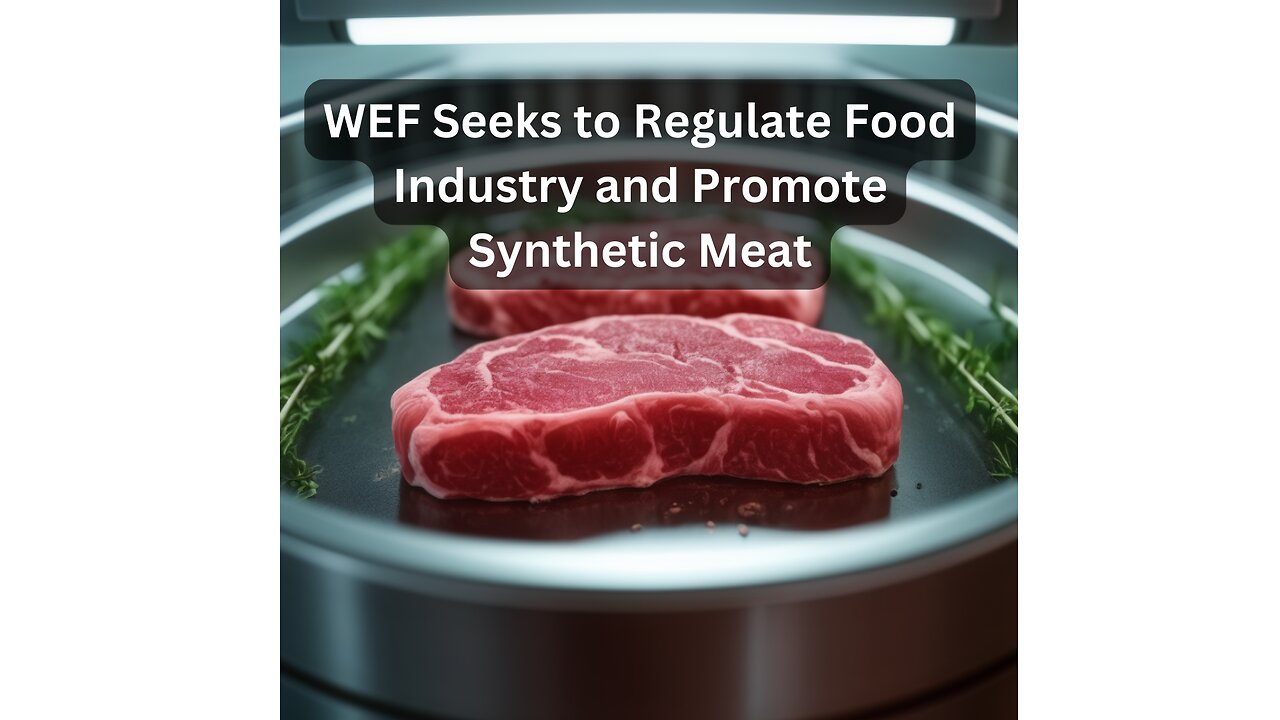Premium Only Content

Revealed: WEF’s Push for Fake Meat to Control Your and What You Eat
The World Economic Forum (WEF) is advocating for governments to endorse fake meat and alternative proteins to influence consumer behavior. In their white paper, “Creating a Vibrant Food Innovation Ecosystem: How Israel Is Advancing Alternative Proteins Across Sectors,” the WEF argues that a global collaboration between governments and corporations is necessary to promote these alternative proteins and modify human behavior.
The report stresses that government leadership is crucial to address significant global challenges by:
- Accelerating protein diversification
- Advancing sustainable production systems
- Driving consumer behavior change
The push for alternative proteins is rooted in the belief that meeting the Paris Agreement obligations and decarbonizing the global economy requires investing in sustainable protein diversification and transforming the overall food system.
The WEF claims that prioritizing alternative proteins can help nations achieve goals related to climate, biodiversity, food security, and public health. However, the high-tech nature and significant capital expenditure requirements of alternative proteins pose challenges for some private sectors, necessitating government intervention to steer consumer behavior within existing frameworks.
In contrast, countries like Italy have banned lab-grown meat, and similar legislation is being proposed in states such as Florida, Alabama, Arizona, Kentucky, and Tennessee. The WEF emphasizes the need for open-access research and private sector incentives to fully realize the benefits of plant-based and cultivated meat and make these options accessible.
Interestingly, the latest WEF report omits the mention of insects as an alternative protein, focusing instead on plant-based meat, cultivated meat, and fermented products. The WEF argues that alternative proteins can significantly benefit planetary and public health by addressing challenges related to climate change, food security, and planetary health.
Ultimately, the WEF's push for alternative proteins aims to disrupt traditional farming, control land use, and influence food consumption patterns. While the report suggests that integrating alternative proteins into national policies could positively impact global food systems, critics argue that this agenda seeks to undermine independent farmers, centralize control over food production, and impose strict regulations on food choices. This initiative is part of a broader strategy by global elites to control essential resources such as food, money, and energy through measures like carbon footprint trackers and central bank digital currencies.
In summary, the WEF's agenda involves manipulating food systems to promote fake meat and alternative proteins, claiming it will address global challenges. Critics, however, view it as a means to centralize control over food production and limit individual choices.
-
 1:33
1:33
Conspiracy Chronicle
1 month agoTrump Declares War on Big Tech Censorship with Bold FCC Pick
1051 -
 1:57:31
1:57:31
2 MIKES LIVE
14 hours ago2 MIKES LIVE #170 with special guest Rep. Buddy Carter (R-GA)
56.6K3 -
 1:02:58
1:02:58
Flyover Conservatives
1 day agoA Doctors Response to Trump’s First Moves: W.H.O. and FDA - Dr. Troy Spurrill; A REAL-LIFE Approach to Health and Wellness Transformation - Kellie Kuecha Moitt | FOC Show
86.9K6 -
 41:50
41:50
State of the Second Podcast
10 hours agoWhat do Gold and Guns have in common?
40.1K4 -
 1:01:26
1:01:26
PMG
6 hours ago $2.68 earnedLibs In FULL PANIC Since Trump Took Office! Creating a Faith to Fit their Agenda
28.9K9 -
 7:09:22
7:09:22
Dr Disrespect
14 hours ago🔴LIVE - DR DISRESPECT - TRIPLE THREAT CHALLENGE - EXTREME EDITION
258K32 -
 55:00
55:00
LFA TV
14 hours agoThe End of the January 6 Hoax | TRUMPET DAILY 1.22.25 7pm
48.6K12 -
 1:13:37
1:13:37
Battleground with Sean Parnell
12 hours agoPresident Trump Is On FIRE w/ Savage Rich Baris
187K27 -
 1:59:59
1:59:59
Melonie Mac
8 hours agoGo Boom Live Ep 34!
79.4K14 -
 49:27
49:27
Sarah Westall
7 hours agoTrillion Dollar 5G Lawsuit, Project Archimedes, Mind Control & DEW Weapons w/Attorney Todd Callender
80K38